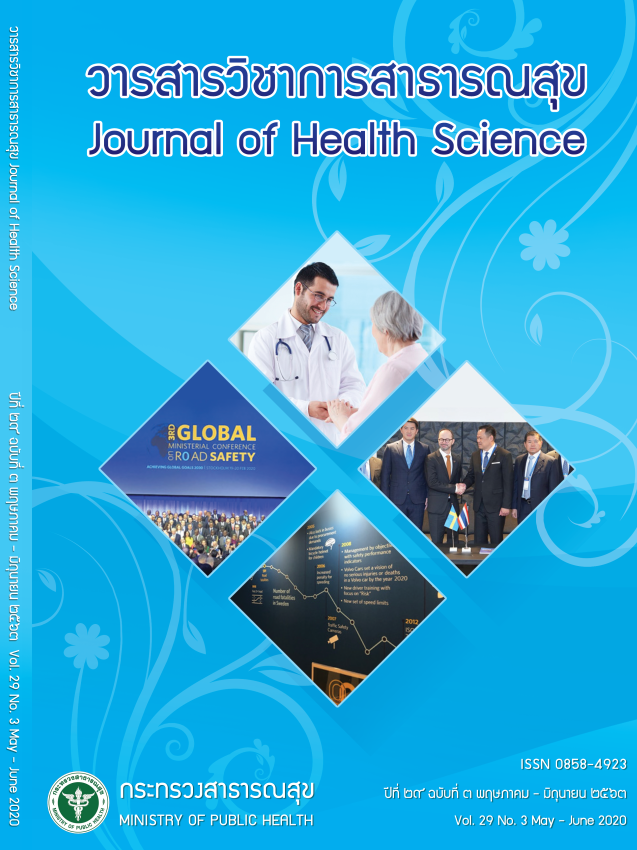Development of Care Model for Psychiatric Patients at Amnatcharoen Hospital, Ubol Ratchathani Province, Thailand
Keywords:
psychiatric disorder, chronic care model, care of psychiatric patientsAbstract
The objective of this study was to develop a care model for psychiatric patients at Amnatcharoen Hospital using the Chronic Care Model framework. The duration of study was from October 2015 to March 2017. The study participants were personnel in mental health clinic at Amnatcharoen Hospital, a clinical psychologist, an internist, staff at health promoting hospitals in Muang District, staffs from health center, psychiatric patients and their relatives. The total number of participants were 101. The operation was assessed quantitatively and qualitatively. The study used descriptive statistics to explain the results of qualitative operation. Percentage statistic measured Work load of patient care was measure by using percentage. In the process, a model of psychiatric pateint care network was clearly stablished; and a clinical practice guideline was developed. After 6 months of operation, the graded prognosis score (GPA) had improved (from 2.556 to 9.54) which implied that the patients had better mental health. The caring load of relatives was alos found to be reduced; and better attitude was also observed. The qualitative assessment revealed that the percentage of missing appointment reduced to 8.40%; and the percentage of lacking of medicine reduced to 5.30%. The study had a limitation as there was an uncontrollable factor affecting psychiatric patients’ symptoms due to the difference in medicines for treating each psychiatric patient. Continued evaluation of the model was recommended every 3 months, 6 months and 1 year.
Downloads
References
มาโนช หล่อตระกูล. จิตเวชศาสตร์ รามาธิบดี. พิมพ์ครั้งที่4. กรุงเทพมหานคร.ภาควิชาจิตเวชศาสตร์ คณะแพทย์ศาสตร์ โรงพยาบาลรามาธิบดี มหาวิทยาลัยมหิดล; 2558
สำนักงานพัฒนานโยบายระหว่างประเทศ.รายงานภาระโรคและการบาดเจ็บของประชากรไทย พ.ศ.2556. นนทบุรี: เดอะกราฟิ โก ซิสเต็มส์; 2558.
MacColl Institute for Health Care Innovation. Chronic Care Model [Internet]. [cited 2017 Feb 14]. Availiable from: http//www.improving chroniccare.org//index.php
ปัทมา โกมุทบุตร, กฤษฏิ์ ทองบรรจบ. เอกสารประกอบการเรียนรู้ Chronic Care Model [อินเทอร์เน็ต]. เชียงใหม่: คณะแพทยศาสตร์ มหาวิทยาลัยเชียงใหม่; 2551 [สืบค้นเมื่อ 14 ก.พ. 2560]. แหล่งข้อมูล: www.med.cmu.ac.th/dept/commed
สำนักงานหลักประกันสุขภาพแห่งชาติ. คู่มือการดูแลผู้ป่วยจิตเวชเรื้อรังในชุมชนสำหรับบุคลากรของหน่วยบริการระดับปฐมภูมิ. กรุงเทพมหานคร: แสงจันทร์การพิมพ์; 2559.
สมชาติ โตรักษา. การบริหารโรงพยาบาลและการประกันสุขภาพถ้วนหน้าของประเทศไทย. เอกสารวิชาการสมาคมนักบริหารโรงพยาบาลประเทศไทยชุดที่ 12. กรุงเทพ-มหานคร: พี. เอ็น. การพิมพ์; 2544.
วรัทยา ราชบัญดิษฐ์. การพัฒนาระบบการดูแลผู้ป่ วยจิตเวชโรงพยาบาลปลาปาก จังหวัดนครพนม. วารสารสมาคม-พยาบาลฯสาขาภาคตะวันออกเฉียงเหนือ 2556;31(3):48-56.
Downloads
Published
How to Cite
Issue
Section
License

This work is licensed under a Creative Commons Attribution-NonCommercial-NoDerivatives 4.0 International License.







